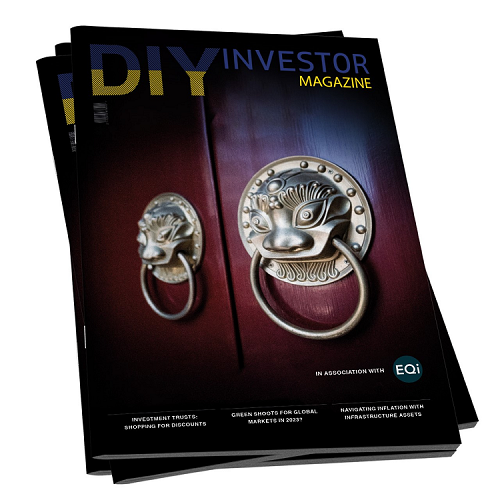Apr
2023
DIY Investor Magazine Issue 37
DIY Investor
21 April 2023
Strings attached…
It was impossible to tune in your Roberts, or flick on Cash in the Attic this ISA season, and not encounter an advertisement for an investment platform.
Having established DIY Investor in the belief that personal financial responsibility would inevitably replace state support, in a recent article – DIY Investing Comes of Age – we celebrated the fact that DIY Investing has entered the mainstream.
However, by their very nature, it is difficult for the platforms to allude to improved financial outcomes, or a better lifestyle; instead, we are told that investing makes you ‘feel good’ or offers ‘value’.
When my examiner told me I’d passed my driving test, he said ‘now go and learn how to be a good driver’.
Opening an account is just the first step to becoming a successful investor, which is why resources such as DIY Investor are so important in delivering ongoing education and information.
Historically, there have been plenty of missed opportunities to educate and engage people in a journey to financial freedom; my dear old dad feverishly clipped coupons and sent off cheques for the 80s flotations and did the ‘right thing’ by building a nest egg.
However, what he didn’t do was bank a quick profit and build a diversified portfolio. ‘People like him’ didn’t know that £10,000 invested in a MSCI World tracker in 1985 would now be worth £206,000; Mum still holds most of those shares to this day.
Similarly, however well-intentioned, the Child Trust Fund missed the opportunity to educate and engage parents in long-term investing; the biggest winners were those that needed it the least, and more than 1m ‘pots’ are estranged from their child, depriving them of the improved life chances the scheme intended.
Changing behaviour in response to evolving circumstances in many walks of life can be relatively frictionless, and the new normal often comes with tangible benefits.
But for those that crave instant gratification, the idea of adopting a ‘get rich slow’ investment strategy may feel like complete anathema.
Subscribers to the FIRE movement (financially independent, retired early) describe what many of us would consider to be an unbearable level of frugality in pursuit of a single objective; however, the sky-high cost of accommodation, uncertain provision of healthcare and concerns over discretionary benefits such as the state pension, are just some of the reasons why more and more people will have to take personal financial responsibility.
One of the biggest impediments to savers becoming investors is the fear of losing their money; whilst every investment inevitably comes with a risk warning, those that invest a little of themselves, will quickly get to grips with the risks associated with different types of investments, and find those that are most suitable for them.
Cautionary tales about meme stocks and crypto abound, and there are some fiendishly clever scammers around, so learn enough to do a ‘if it seems too good..’ sniff test.
It may not feel comfortable looking at a particular sector and seeing that the best performing fund is one that lost less than the rest; the trusted voice says that investing beats saving over the long-term and that short-term volatility is just a fact of investing life.
There’s no short cut to the basic level of knowledge that will enable you to become a confident and competent investor, but your effort should be repaid in spades.
Some years ago, after a refreshing evening at Tunbridge Wells Assembly Hall watching the Ukulele Orchestra of Great Britain, I went on to beginnerukuleles.com and was soon a hundred quid lighter. It’s still in the box.
- Green shoots for global markets in 2023
- Navigating inflation with infrastructure assets
- Investment trusts: Shopping for discounts
- US and EU ‘IRA’: Made in China?
- Top tips for maximum efficiency at the turn of the tax year
- The real book
- Gilts and gold funds shine in flight to safety
- A value view: The Merchants Trust PLC
- QD View: Discounts, time to get serious?
- Equity strategy and market outlook
- Mind the gap: Women’s finance hit hardest by cost-of-living crisis
- 45% of UK investors don’t understand how their investments are taxed
- Keep calm and carry on: Wise words from investing legends that have seen it all
- India: If you build it, they will come
- Investing Basics: Is a SIPP right for me?
- Piece by piece
- Hardman Talks: Intellectual property
- Saver > Investor: What do ETFs invest in?
- Optimism and balanced portfolios
- Saver > Investor: Understanding cash flow
- Technology funds bounce back
- Saver > Investor: A simple guide to risk profiled funds
Brokers Latest » Commentary » Equities Latest » Exchange traded products Latest » Latest » Take control of your finances commentary

Leave a Reply
You must be logged in to post a comment.